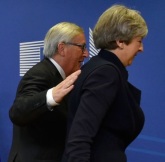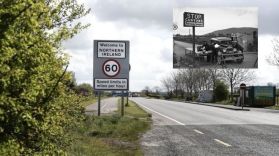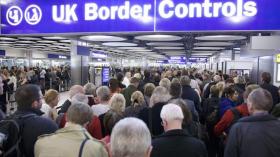“So what the hell happens now?”(Daily Mirror 25 Jun 2016)

President Junker & Premier May
Here in Ireland we have been watching with growing incredulous and grim fascination the debates in the British House of Commons. We have also watched the more sedate proceedings in the European Parliament but again with a certain incredulity that the members representing the 27 other countries could by and large have a different conception of what Brexit means and the not ungenerous agreement made with the exiting member. Indeed watching the debate in Brussels the other day (29th January 2019) it was difficult to see if the representatives from the 27 (and there were no contributions from the Irish members) and those from the Britain were actually talking about the same thing.
A few days ago an article was published by Nick Denbow, Editor-Emeritus of the Industrial Automation Insider which pointed out the unpreparedness of British for what will happen on 29th March 2019 – whatever it is. He states that “the past year been disastrous for UK industrial investment in instrumentation and control.” He points out press releases from British companies announcing new products have dwindled. This is something we in Read-out have also noticed. It would appear that industry in Britain has by and large been in a state of stagnation – “torpor” is the word he uses – waiting hoping for a favourable and non-disruptive result to the interminable negotiations. This would appear to be confirmed today by Dharshini David of the BBC when he says, “Business investment is stagnant…” (See bottom of page for link). In our experience no native instrumentation and control body or publication, with few notable exceptions, such as Processing Talk and GAMBICA, seems to realise exactly what is going down the line still less really understands what the implications of BREXIT are! The majority seem to think that everything will be alright on the night!
But in reality nobody knows.

Who am I dealing with?
In contrast, Irish industry has been inundated with information on State sponsored events, courses, seminars seeking to prepare us for BREXIT whatever form it takes. From this side of the Irish Sea there appears to be no such thing as a soft BREXIT. It is the very nature of the BREXIT beast to be hard.
In the twenty seven countries still committed to the European Union and the rest of the world there is little of this paralysis either. I&C companies are developing new products and marketing them much as before. There are preparations in each country of course to protect themselves and the Union’s standards to a greater or lesser extend depending on their closeness and inter-activity with Britain. Customs and Excise personal are being recruited and passport controls are being augmented in those countries with direct contacts with British Ports, Netherlands, Belgium, France, Spain as well as Ireland. As I look from across the sea the preparations in Britain appear to be haphazard. What will happen in Holyhead for instance? David Davis, a onetime Minister for Brexit, recognised in 2017, that there “might” be some complexities there. Have those been identified and confronted?
Nobody knows?

The Northern Ireland Border (inset:before EU)
Let us take paperwork. Every consignment coming from a third country to Ireland, or any EU country, will have to have paperwork, sometimes quite complex paperwork. These consignments are held until that paperwork is scrutinised and passed at the point of entry. In Dublin, and other Irish Ports, these holding places are being expanded as we speak and this has speeded up as the prospect of a no-deal BREXIT hoves into view. Today I can drive over in my car to Britain and pick up equipment and drive back home with nothing more than an invoice. I remember what it was like before waiting interminable hours in what was known as the “Long Room” to clear good. Driving outside of the Ireland I had to have a “Green Card” for car insurance. This applied also to Northern Ireland. Is this coming back? Will driving licences be recognised?

Coming to an airport near you?
Nobody knows?
Then there is the tax problem. I was speaking to a small business owner the other day who had attended one of these BREXIT meetings in Clifden far out in the west of Ireland and they believe that their cash flow will experience problems and they will have to increase cash availability by about 40% – yes forty percent. A lot of that will have to be available to pay VAT and other duties at point of entry in the event of no agreement. I know of at least one company that went to the wall in the eighties prior to the common trade arrangements because of this requirement. Indeed even if an agreement is arrived at then this could very well be the situation at the end of the additional two year period allowed in Mrs May’s December agreement.
Nobody knows?
The other day we published an article by Dominique Stucki of ABB’s Control Technology unit on maintaining standards in the food industry. These are fostered by the EU funded (€30million) IOF2020 Group aimed at building a lasting innovation ecosystem that fosters the uptake of IoT technologies. Will Britain as a third party country benefit from this work? What about the many other standards implemented throughout the union?
Nobody knows?
That Britain will survive BREXIT there is little doubt but if it reaps any benefit from it depends on how they manage it. The British Press will blame Europe and the Irish for whatever failure happens, that much is clear. But Europe and Ireland did not ask for BREXIT. That Europe strives to defend its institutions and hard fought for advantages is hardly surprising. Britain as an active member for over forty years contributed much to these institutions and policies. That it should choose to put all that productive work at naught is indeed a great mystery. But Britain – or perhaps it is more accurate to say England – is nothing if not resiliant. It is in for a rough time, we all are, but at the end of the day the various nations that make up the United Kingdom, together or apart, will make a go of whatever happens.
When the result of the Referendum was announced and the Westminster administration fell apart we quoted the comment of the President of the European Commission, former Prime Minister of Luxembourg, Jean-Claude Junker, “I thought they had a plan!” As we approach the 29th March 2019 the question of what that plan is remains a mystery.
Nobody knows!
• See also Brexit woes, Nick Denbow, (30 Jun 2016)
• Brexit, What this means for you and your business. (24 June 2016)
• How has business been affected by Brexit so far? Dharshini David, Economics correspondent with the BBC (31 Jan 2019)